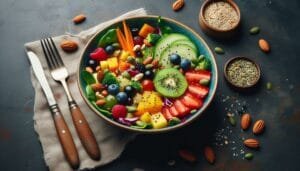Nutritious Diet Plan to Lose Weight is not just a catchy phrase; it’s a hopeful promise for many people. Imagine looking in the mirror and feeling proud of the person staring back at you, brimming with confidence and vitality.
It’s easy to feel lost in a world filled with conflicting advice about diets, especially when it seems like everyone else has found the secret to success. But deep down, you know that lasting change comes from kindness to yourself and the choices you make every day.
This journey is about more than just numbers on a scale; it’s about embracing a healthier lifestyle, enjoying delicious meals, and nurturing your body. Together, let’s explore a balanced approach to eating that allows you to thrive while shedding those extra pounds.

Focus on Whole Foods

The Importance of Whole Foods
The foundation of a good weight loss diet starts with whole, unprocessed foods. These are foods that are as close to how nature intended them as possible. Think fresh fruits, vegetables, lean proteins, whole grains, nuts, and seeds.
These types of foods are packed with vitamins, minerals, fiber, and other nutrients that are great for your body. Plus, they’re generally lower in calories, making them perfect for weight loss. Processed foods, on the other hand, often contain added sugars, unhealthy fats, and empty calories that don’t do much to keep you full or satisfied.
- Examples of Whole Foods:
- Fresh fruits (e.g., apples, berries, oranges)
- Vegetables (e.g., spinach, broccoli, carrots)
- Lean proteins (e.g., chicken, turkey, tofu)
- Whole grains (e.g., brown rice, quinoa, oats)
- Nuts and seeds (e.g., almonds, chia seeds)
Colorful Vegetables
One tip is to fill your plate with a variety of colorful vegetables. These are low in calories and high in nutrients, so you can eat a larger volume without overloading on calories. Plus, they’re packed with fiber, which helps to keep you full for longer.
Think of foods like spinach, broccoli, carrots, bell peppers, and zucchini. They can easily be added to meals like salads, stir-fries, or roasted dishes to bulk them up without adding a ton of extra calories.
Include Lean Proteins and Healthy Fats

Benefits of Lean Proteins
Protein is a key player when it comes to weight loss. It helps to keep you full, builds and repairs muscle, and even boosts your metabolism slightly. Including lean proteins in your diet is a great way to stay satisfied while keeping your calorie intake in check.
- Good sources of lean protein include:
- Chicken breast
- Turkey
- Eggs
- Tofu
- Fish
- Low-fat dairy products (e.g., Greek yogurt)
These foods are versatile and can be included in many meals throughout the day.
The Role of Healthy Fats
Don’t forget about healthy fats! While fat has more calories per gram than protein or carbs, it’s an important part of a balanced diet and can actually help you lose weight. Great options for healthy fats include avocados, olive oil, nuts, seeds, and fatty fish like salmon. Healthy fats help to keep you full and support brain and heart health. Just keep an eye on how much you eat, since fats can pack in a lot of calories.
Watch Your Portions and Mindful Eating

Managing Portion Sizes
One of the biggest challenges when trying to lose weight is managing portion sizes. It’s easy to overdo it, even with healthier options. A good way to control portions is to use smaller plates or bowls, which can trick your brain into thinking you’re eating more than you actually are. Another helpful strategy is to pay attention to your hunger and fullness cues.
Instead of eating out of habit or boredom, listen to your body and only eat when you’re truly hungry. This is called mindful eating, and it can make a big difference when it comes to managing your weight.
Stay Hydrated
Drinking plenty of water throughout the day is another helpful tip. Sometimes, we mistake thirst for hunger, leading us to eat more when all we really need is a glass of water. Aim to drink at least 8 glasses a day, and consider having a glass before meals to help with portion control.
Plan Your Meals and Snacks
credit:Jeremy Ethier
The Importance of Meal Planning
One of the best ways to stick to a healthy diet plan for weight loss is by planning your meals and snacks ahead of time. When you’re hungry and don’t have a plan, it’s easy to grab whatever is most convenient usually something quick and unhealthy. By planning your meals, you’ll have nutritious options ready when hunger strikes, which makes it easier to stay on track.
Balanced Meal Ideas
Try to include a balance of protein, healthy fats, and fiber-rich carbs in each meal.
- Meal Ideas:
- Breakfast: Greek yogurt topped with fresh fruit and a sprinkle of granola
- Lunch: Salad loaded with veggies, grilled chicken, and a drizzle of olive oil
- Dinner: Grilled chicken breast with sweet potatoes and steamed broccoli
- Snacks: Handful of almonds, a piece of fruit, or Greek yogurt with berries
Be Consistent, Not Perfect

The Importance of Consistency
One of the most important things to remember when trying to lose weight is that it’s not about being perfect. There will be days when you slip up, have a treat, or eat more than you planned.
If you have a rough day, don’t stress just get back on track the next day. The key is to be consistent over time, rather than focusing on perfection.
Patience is Key
Losing weight is a process, and it’s essential to be kind to yourself. Focus on making small, sustainable changes that you can stick with for the long term.
Crash diets or extreme plans might help you lose weight quickly, but they’re hard to maintain and can lead to gaining the weight back. Instead, aim for steady, gradual weight loss by following a healthy, balanced Nutritious Diet Plan to Lose Weight that you enjoy.
Final Thoughts
Losing weight doesn’t have to be about cutting out all your favorite foods or following a super strict plan. By focusing on whole foods, including lean proteins and healthy fats, watching your portions, and planning your meals, you can create a Nutritious Diet Plan to Lose Weight that not only helps you shed pounds but also supports your overall health.
Remember, it’s all about balance and consistency. Take it one step at a time, and soon enough, you’ll see the results. You’re more likely to succeed if you enjoy the foods you’re eating and feel good about your choices. A Nutritious Diet Plan to Lose Weight is not just about the destination; it’s about creating a healthy lifestyle that you can maintain.




